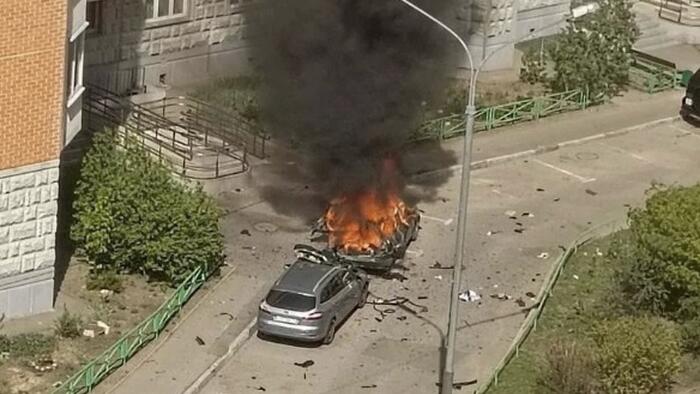Headline:
Top Russian General Killed in Car Bomb Ahead of Key US-Russia Peace Talks
Summary:
A high-ranking Russian military official was assassinated in a car bombing near Moscow, just as a U.S. envoy arrived for critical peace talks with President Putin. The attack raises questions about its timing and potential impact on efforts to end the Ukraine war.
Key Facts:
- Who was killed?
Lt. Gen. Yaroslav Moskalik, a senior Russian military planner involved in war strategy. - What happened?
A homemade bomb exploded under his car in Balashikha, a city 20 miles from Moscow. The blast tore through a residential area. - When?
Friday, April 25, 2025, hours before U.S. envoy Steve Witkoff met Putin to discuss Ukraine peace terms.
The Attack:
- How it unfolded:
Security footage shows the car exploding violently, leaving the vehicle charred and scattering shrapnel. Authorities confirmed the bomb was packed with metal fragments to maximize damage. - Social media’s role:
Videos of the blast spread quickly online, with some users suggesting the attackers knew about the bombing in advance.
Why the Timing Matters:
- Peace talks at a critical stage:
Witkoff (President Trump’s negotiator) has met Putin four times to push for a Ukraine deal. Russia demands Ukraine withdraw from disputed regions and recognize Crimea as Russian territory. - A possible message?
The assassination occurred as Witkoff arrived, sparking speculation: Was this a warning from Ukrainian or European forces opposed to compromise?
Broader Context:
- History of targeted killings:
This isn’t the first attack on Russian officials:- 2022: A car bomb killed Darya Dugina, daughter of a pro-war commentator.
- 2024: A scooter bomb killed Gen. Igor Kirillov, head of Russia’s chemical defense forces.
- Ukraine’s silence:
Ukrainian leaders haven’t claimed responsibility, but past attacks have been linked to Ukrainian intelligence.
Why It Matters:
- Peace talks at risk:
The U.S. wants progress before Trump’s 100th day in office, but attacks like this could derail negotiations. - Escalating tensions:
Assassinations suggest the war is becoming a shadow conflict, with strikes on leaders replacing battlefield clashes.
Unanswered Questions:
- Who planted the bomb? No group has claimed responsibility yet.
- Was the timing intentional? The attack coincided with high-stakes diplomacy.
- How will Russia respond? Past assassinations led to retaliatory strikes on Ukraine.
In Simple Terms:
Imagine two rival gangs trying to negotiate a truce, but just as they sit down to talk, one gang’s top strategist is killed in a drive-by shooting. The murder throws the talks into chaos, with each side blaming the other. That’s what’s happening here—but with nations, bombs, and a war affecting millions.
Stay informed, stay curious. 🌍✨

